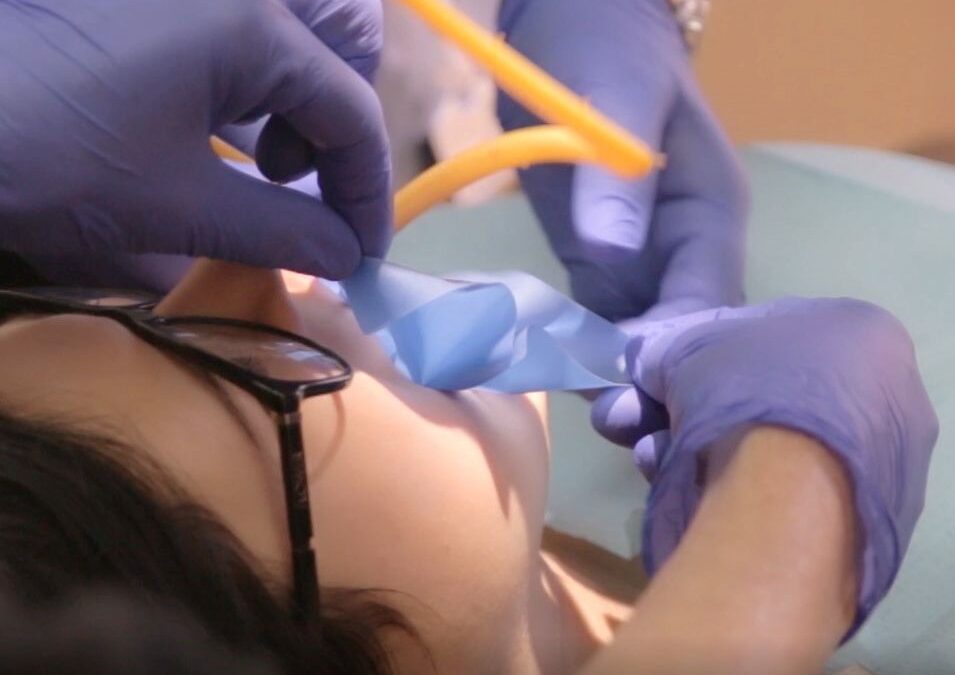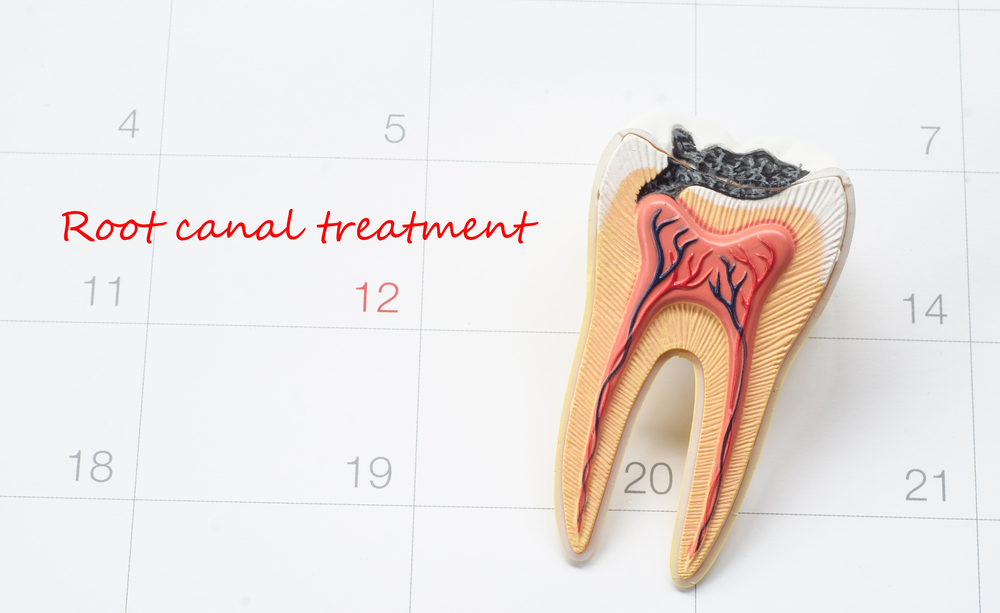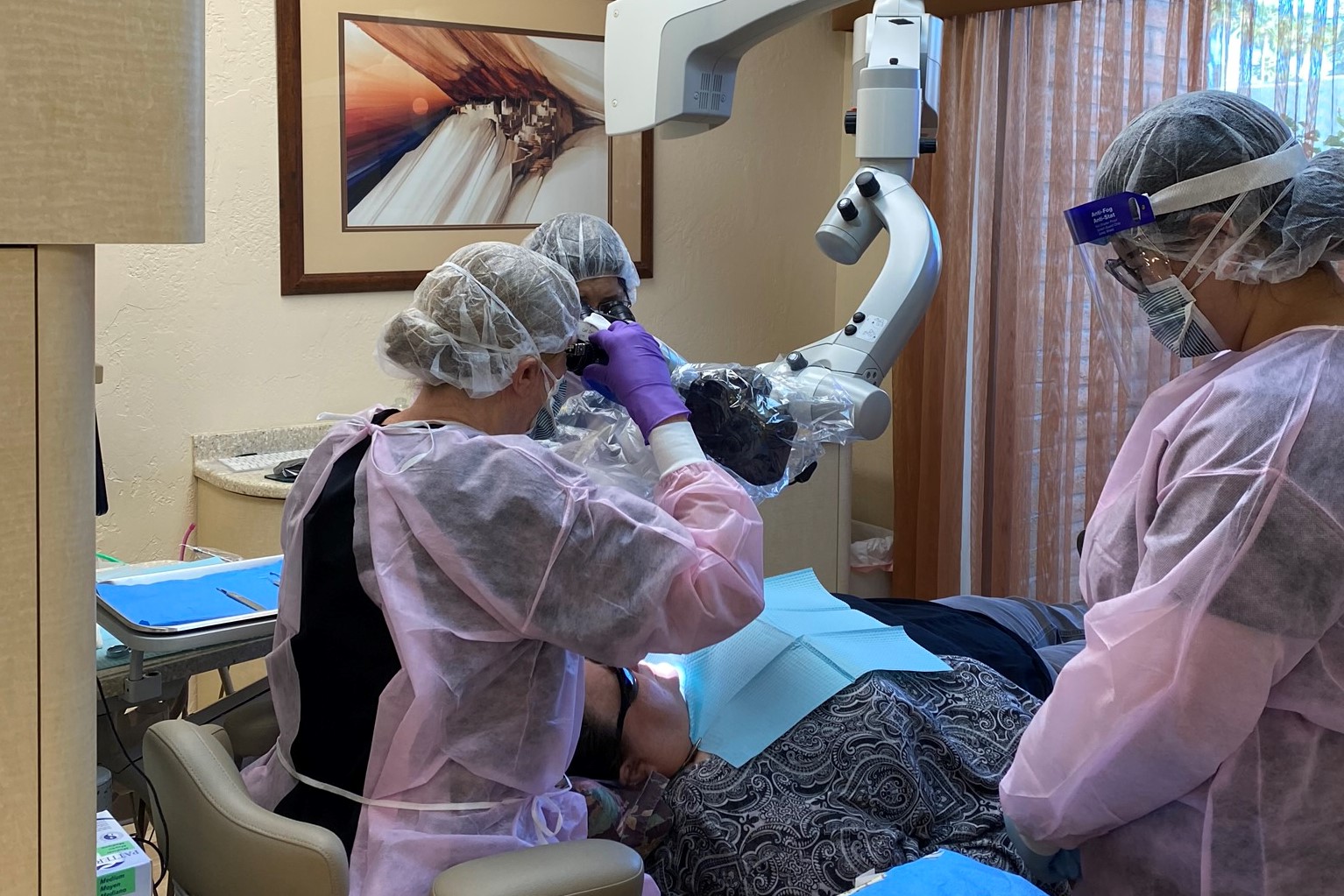
by Dr. Jacqueline S. Allen | Jun 22, 2022 | Blog, Endodontics, Endodontist, Phoenix Endodontic Group, Root Canal
Fixing a cracked tooth can be like figuring out the damage after a car accident. If you don’t have a professional check things out, what looks like a surface dent can actually turn out to be really serious. Since dental bone does not behave like other types of bone and cannot knit itself back together, a chip or a crack to the tooth is likely to get worse over time.
In the case of a cracked tooth, your repair expert is an endodontist. Endodontists are experts in saving natural teeth. They frequently see clients with a cracked tooth, and can use their dental specialty training to determine if additional intervention such as a root canal is needed before placing a crown on the tooth.
 When Does A Cracked Tooth Need A Root Canal Before A Crown?
When Does A Cracked Tooth Need A Root Canal Before A Crown?
The main job of a dental crown is to provide structural support by acting as the new outer surface of a tooth. Before a crown is cemented into place, your endodontist will want to make sure the natural tooth underneath the crown is as healthy as possible. If there is any injury or infection in a tooth’s nerve pulp, a root canal can provide a healthy tooth underneath.
With a crack deep enough to damage the root pulp, a root canal will be needed to prevent further difficulty, possibly extraction. It can be difficult to tell from symptoms alone if you need a root canal before you get a crown placed on your cracked tooth. Some cracked teeth that need a root canal before the crown hurt a lot; some do not. Some teeth with large cracks do not have root/nerve damage, but some teeth with much smaller cracks may have infected nerve pulp that must be removed via a root canal.
It’s important to see your endodontist right away because there are some types of cracked tooth injuries that cannot be remedied with a root canal and a crown. If the crack in the tooth extends below the gum line, it’s highly likely that the tooth will need to be extracted.
“It’s vital to have an endodontist perform a careful evaluation of a cracked tooth – what you can see on the surface may not be an accurate picture of the entire situation,” says Dr. Allen, who practices with the Phoenix Endodontic Group. “Our office can perform the diagnostic procedures needed to determine if a root canal is called for before a crown is placed on the tooth.”

by Dr. Jacqueline S. Allen | May 13, 2022 | Blog, Endodontics, Endodontist, Root Canal
It’s fact – maintenance costs less than replacement. While dental implants provide hope for those suffering tooth loss, the costs of preservation – both financial and physical – are often far lower.
The American Association of Endodontists sponsors Save Your Tooth Month each May to highlight the importance of receiving care to retain your natural teeth. Endodontists perform many of the 15 million root canals done annually, handling an average of 25 per week (general dentists perform an average of two per week). Endodontists complete years of training beyond dental school, learning to preserve compromised natural teeth and manage patient discomfort with cutting-edge technology and surgical techniques.
 Reasons To See An Endodontist To Help Save Your Tooth
Reasons To See An Endodontist To Help Save Your Tooth
Our natural teeth are facing new threats. COVID-19 continues to change our lives, and many patients are still reeling from its impacts. Isolation and turmoil result in increased persons reporting cracked teeth as a result of grinding their teeth. Many families chose or have been forced to forgo regular dental check-ups, or to put off badly needed dental work.
Endodontists can help diagnose confusing cases of tooth pain. With so many patients delaying routine care, the number of toothaches that do not receive proper diagnosis or treatment has risen. Injured or infected teeth can present odd or intermittent types of pain while damage continues in tooth pulp and root canals. If left untreated, the periodontal ligament and gums can become involved. Endodontists can work with other specialists to determine what’s happening and how to save your natural teeth.
An endodontist has probably dealt with a case like yours before. No matter how complex the challenge, it is probably familiar to your endodontist. Many endodontists have close referral relationships to general dentists and other specialty dentists, so if your challenge requires attention beyond the scope of their practice, they can help you find the right provider.
Your teeth are worth saving! The social impact of lost teeth can be profound. Our culture values capturing memories with photos and scrapbooks – and learning how to “smile for the camera” to de-emphasize your tooth loss can be a difficult and unpleasant chore. Natural teeth make the best smile.
“We encourage everyone to learn more about how endodontists practice in the 21st century,” says Dr. Allen, at the Phoenix Endodontics Group. “In the last generation, root canals and other procedures to save natural teeth have become easier, more successful, and more comfortable for patients. Don’t let fear keep you from treatment that may save your teeth!”

by Dr. Jacqueline S. Allen | Apr 20, 2022 | Blog, Endodontics, Phoenix Endodontic Group, Root Canal
General dentists frequently work with endodontists on procedures, such as root canal treatments, designed to save natural teeth. Dentists often develop strong referral relationships with endodontists and may also place the crown that completes the root canal treatment. One topic, however, on which there is not general consensus between dentists and endodontists concerns the use of rubber dental dams during root canals.
A dental dam is a small sheet of latex or non-latex material that can have a hole punched in it so that the tooth a practitioner wants to work on is physically separated by the dam from the rest of a patient’s mouth. A 2015 survey revealed that only 47 percent of general dentists from a variety of backgrounds reported always using dental dams during root canals. In contrast, the American Association of Endodontists reaffirmed a position statement in 2017 asserting, “Tooth isolation using the dental dam is the standard of care; it is integral and essential for any nonsurgical endodontic treatment.”
Why are dental dams considered critical to endodontic care? Let’s look at the advantages when rubber dams are used during root canals and related procedures.

Why Endodontists Use A Rubber Dam During A Root Canal
-
It isolates the tooth being worked on from bacteria in your saliva. This is important for maintaining a sterile environment for the tooth.
-
It prevents water, debris, or anything else from going down your throat. This protects a patient from ingesting contaminants, fillers, or even cleaning tools used during a root canal.
-
It keeps the treatment area dry. This allows many types of dental materials to bond properly.
-
It can protect the gag reflex area, and create a feeling of separation of the rest of your body from the treatment area. These last two advantages can be especially important for clients who need a root canal but suffer from dental phobia.
“We use rubber dental dams in our practice during root canals to ensure we meet the highest standards of safety and quality,” says Dr. Jacqueline Allen, who practices with the Phoenix Endodontic Group. “Our endodontists are happy to explain their advantages. We also can answer questions about the use of dental dams or any other aspect of a root canal if you have any anxiety or concerns.”

by Dr. Jacqueline S. Allen | Mar 24, 2022 | Blog, Endodontics, Endodontist, Phoenix Endodontic Group, Root Canal
Although advancements in technology and microsurgical techniques have made root canals more comfortable and less stressful, the procedure still requires significant investment of time, money, and care. Root canals aren’t inevitable, though – you can reduce your risk of needing one with targeted, proactive self-care.
The tips below can help you prevent a root canal. They focus on managing your risk of falling prey to the three major causes of root canals: tooth decay, infection, and injury. By diligently following these tips, you can greatly lower your chance of needing a root canal, or developing serious oral health problems.

Keeping Teeth Strong And Healthy: 5 Tips For Avoiding A Root Canal
- Brush your teeth twice a day. A twice-daily toothbrushing routine is the first line of defense against tooth decay, a major contributor to the type of dental pulp infections that require a root canal to resolve. Use an American Dental Association (ADA) approved fluoride toothpaste on a soft-bristled toothbrush.
- Floss your teeth once a day. This will amplify the effectiveness of brushing your teeth. Flossing cleans the 40 percent of tooth surfaces that cannot be reached by brushing.
- Strengthen your teeth with calcium-rich foods. Dairy products such as milk, yogurt, and cheese provide calcium to protect and build tooth enamel. You can also get calcium by eating green leafy vegetables, including bok choy, Brussels sprouts, and kale.
- Use care when you bite down. This tip applies any time you apply force with your teeth. Be careful eating foods like nuts or peanut brittle or hard pretzels. And if you use your “teeth as tools” to rip, tear, or clamp down on things – stop it!
- Wear a mouthguard for sports or workouts. Use a mouthguard when playing ANY sport where a collision or fall is possible. Mouthguards should also be worn during fitness activities such as rock climbing, hiking, or even cycling. To best avoid dental injury that could lead to a root canal, get your mouthguard professionally fitted.
“Chances of needing a root canal can be minimized with proper planning and the right habits,” says Dr. Allen an endodontist at Phoenix Endodontic Group. “Visit your dentist for regular checkups and cleanings, and always let them know if you experience any discomfort or symptoms indicating you need a root canal.”

by fisherwebdesign | Mar 3, 2022 | Blog, Business, Endodontist, Phoenix Endodontic Group
Now Hiring Associate Endodontist

(Phoenix Location)
Now is the time to join a fast growing organization located in Central Phoenix Arizona. You will have opportunities to learn new skills from our team of experienced professionals. Our practice has invested in the latest clinical technology to provide patients with the best endodontic care found anywhere. We utilize CBCT, surgical microscopes, TDO Software, Biolase & Fotona dental lasers, digital scanners, etc.
Are you coming to Phoenix in April for AAE 2022?
Call us today so we can schedule a time to meet you.
If you’re ready to take your career to the next level and gain valuable experience,
don’t miss this opportunity.
Overview:
You’ve invested the time to become a great endodontist, now let us help you take your career further with more opportunity, experience leadership and one of the best tried and true practice models today. We call it – “high tech – high touch”. As an endodontist working in an office supported by Our Team, you can rely on steady referrals (20 years in practice) as you will be providing patients of our referring (dentist) partners with high quality, efficient endodontic care. You will have the ability to provide your patients the care they deserve and provide you with the opportunity to earn excellent income and have a balanced lifestyle without the worries of running a practice.
If you are interested in joining a respected endodontic practice with 20 years of experience. Submit your resume today! Email: kevin@drallenendo.com

by Dr. Jacqueline S. Allen | Feb 22, 2022 | Blog, Dental Implants, Dentistry
When you are missing or have failing natural teeth, you may wonder if your only option is to live with this condition. You could get dentures, but maybe you worry they won’t be compatible with your lifestyle, or take too much effort.
Dental implants are the other common solution to natural tooth loss. They are not for everyone, but different types of implants exist for different treatment challenges. Here’s a quick guide to three common types of dental implants, plus one more also gaining popularity.
 Understanding The Three Types Of Dental Implants
Understanding The Three Types Of Dental Implants
Endosteal Implants – These are the most commonly used dental implants, one of two types recommended by the American Academy of Implant Dentistry. A titanium cylinder (screw) or blade is placed in the jawbone, in the socket of the missing tooth. Endosteal dental implants take four to six weeks to heal, while the implant bonds to the bone through a process called osseointegration. After the healing is complete, an abutment is placed where the new tooth is placed securely on top of it.
Subperiosteal Implants – These implants are an alternative for patients who are not good candidates for the endosteal dental implant procedure. Instead of being placed directly into the jawbone, they are placed between your jawbone and your gum tissue. They can work well for patients who don’t want to use bone augmentation to strengthen their jawbone, or whose jaw simply won’t support the surgery for endosteal dental implants.
All-On-4® – For patients missing an entire arch (upper or lower) of teeth, this implant approach provides a cost-effective alternative to replacing each tooth individually.
During an All-on-4® dental implant procedure, four angled titanium implants are placed in your mouth for each arch of missing natural teeth. You may be provided a special set of abutments and temporary overdentures if your dental provider has elected to do a “teeth in a day” approach. You will eat a modified diet for up to six months while osseointegration is taking place. Once that process is complete, you’ll receive a permanent set of overdentures and can return to eating all the foods you love.
Another new type of popular dental implant is called the Mini-Dental Implant (MDI). An MDI is primarily used to stabilize a lower denture. It is about the width of a toothpick and consists of a socket, ball, and a rubber ring on the end. This type of implant is less invasive, requires less healing time, and generally lasts for many years, depending on the hygiene regimen and other factors for individual candidates for this procedure.
“Dental professionals who provide dental implants have a number of options to fit a variety of patient treatment scenarios,” says Dr. Jacqueline S. Allen, who practices with the Phoenix Endodontic Group. “Our practice is happy to discuss which type of dental implant holds the greatest chance of providing a permanent solution for your natural tooth loss.”

 When Does A Cracked Tooth Need A Root Canal Before A Crown?
When Does A Cracked Tooth Need A Root Canal Before A Crown?







